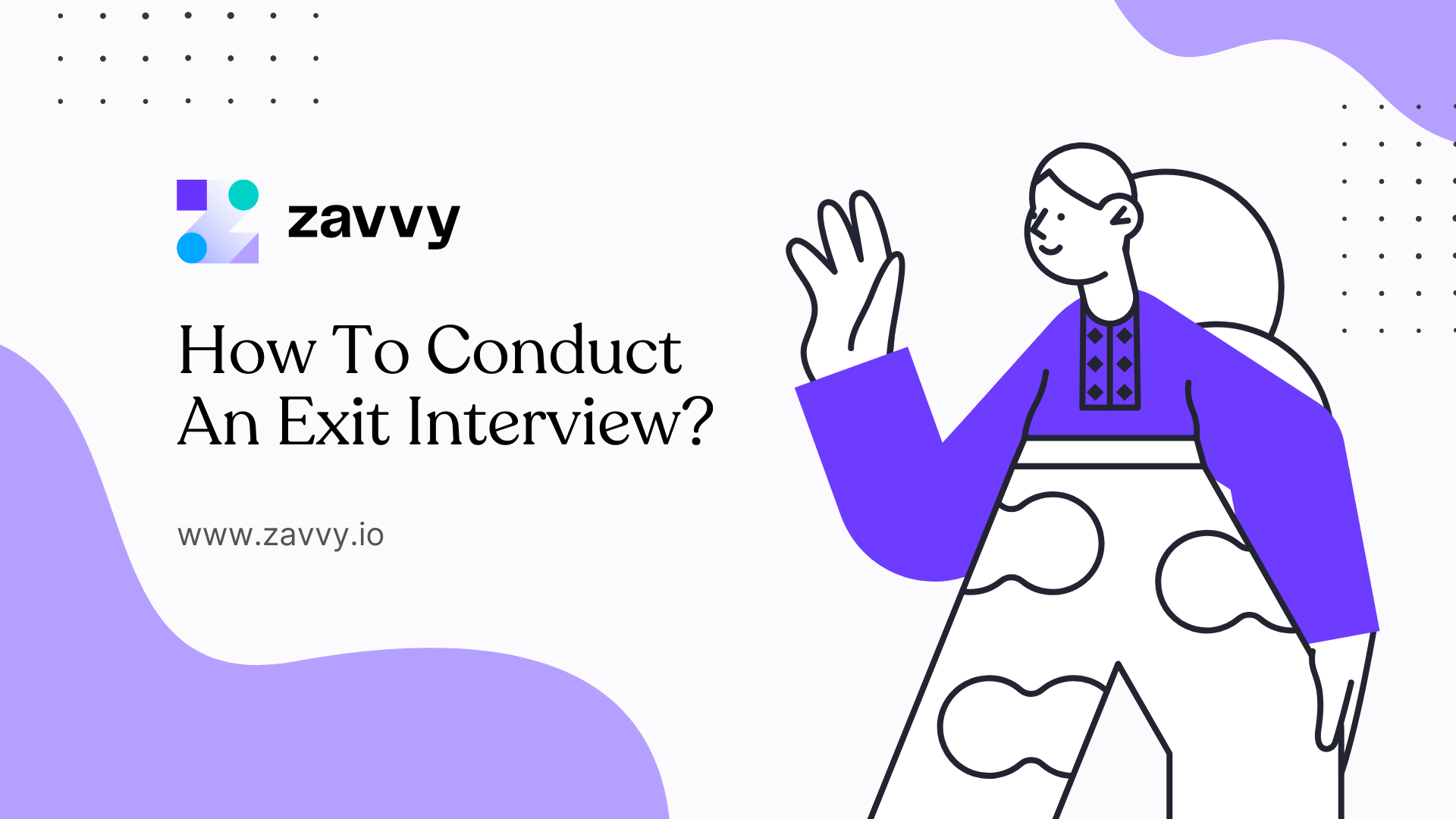
Alexander Heinle
Alex is a marketer at Zavvy. On this blog, he mainly shares insights gained from discussions with selected experts and from helping our customers set up and improve their onboarding or learning programs.


What happens when an employee gives their 2 weeks (or 3 months) notice?
Many organizations immediately scout for replacement. Their sole focus is crafting a job description and posting the job ad, evaluating suitable candidates for the role, and ushering in a new employee to fill the vacant position.
However, have you really considered the employee leaving your company? Have you given them any attention to unearthing their reasons for leaving the organization?
They could be leaving an organization for many reasons.
For example
But, if you don't ask, how would you know any of these?
Since a leaver has little or nothing to lose, an exit interview can also be an excellent opportunity for them to
This article will uncover everything you need to know about exit interviews and how to use them as a powerful part of your bigger employee retention strategy.
Together with our curators, we have created a library of actionable digital marketing resources. Personalized to your team's needs.

An exit interview is a conversation between an organization and an employee who is leaving the business. Typically, the conversation is between the outgoing employee and a member of the HR team.
It's the part of the offboarding process that helps you understand why someone has decided to leave in the hopes that your organization can prevent those mistakes that could cause other employees to follow suit in the future.
Exit interviews are also great for determining competitor benchmarks. For example, suppose an employee complained about a lower salary and left your company for a competitor with greater pay. In that case, an exit interview could offer you insights on current market standards (salary) and other attractive benefits employees want.

The Society for Human Resource Management (SHRM) recommends following the following main principles:
While exit interviews and stay interviews often pose similar questions to employees, there are still some differences.
An exit interview occurs after an employee has officially resigned.
A stay interview, on the other hand, is conducted periodically throughout the employee life cycle in the organization.
Stay interviews help to understand
They are part of your employee journey map — a tool to determine employee experience at every stage of an employee's tenure in the organization.
According to StoryTap's People & Culture Lead, Jasmine Leong:
"Exit Interviews can be an amazing data point for HR departments if done well. Together with stay interviews and engagement surveys, your HR team should be able to paint a good picture of your strengths and opportunities as an organization and ultimately reduce your team's turnover rates."

Exit interviews are among the most honest conversations employees would have with their employers. They are an organization's one shot at knowing what that employee truly thinks about it.
Employees rarely quit their jobs without reason. Finding out why is the single most powerful insight to improve retention in the future.

StoryTap's Jasmine Cheong recommends having an impartial HR team member conduct the exit interview:
"You want to ensure that the respondent isn't too preoccupied with how their responses may affect future references, so they're not worried about damaging relationships. This way, you get the most authentic answers, with the ability to paraphrase the feedback productively."
Sylvain Roy, CEO and HR Consultant at Folks, adds that the best option is to have HR professionals be in charge of exit interviews.
"The person conducting the exit interview needs to position themselves as an ally in the organization and as a team player who cares about employee well-being. In any case, the interview should not be conducted by the immediate supervisor, as it is important to maintain a good level of objectivity during the exchange," he adds.
Selecting someone from the People team doesn't only eliminate bias:
It also ensures that any feedback gets implemented more quickly.
Some organizations use external companies or consultants. But this might come off as impersonal or violative, especially for employees who enjoyed working at the organization.
Exit interviews don’t have to be frigid or impersonal just because an employee is exiting a company. When conducted properly, exit interviews are goldmines for gleaning new knowledge on what could be done to make the organization better.
Krittin Kalra, the founder of WriteCream, believes that the best way to conduct an exit interview is to have a one-on-one conversation:
“It should be conversational and not rigid. It should be a conversation that is open-ended and not overly structured — one that doesn’t make the employee feel anxious or nervous while preparing for it or during the exit interview itself."
Your main goal during an exit interview is to actively listen to the employee to understand what they’re saying. When you actively listen, your action tells the employee that the feedback they’re giving is important to you and the organization.
Jasmine from StoryTap prefers doing the meeting in person wherever possible -- or at least with the video on, if it's over zoom -- to really connect with who you're speaking with and build a trusting relationship.
"It's okay to ask the employee to complete a written survey before the exit interview (hint: ask politely).
Questions asked should always be the same across the board so that they're comparable", Jasmine Cheong recomends.
If the resources are available, send over a survey with standardized questions (i.e. On a scale of 1-10, how did you find the company), so we're able to draw data points and trends -- and then dive deeper into answers that stand out during the actual exit interview as well.
Asking these questions allows them to reflect on their replies in advance. And reading responses before the meeting helps you create a list of questions you can ask to guide the conversation.
Jasmine says that she'd also get the respondent's permission to share the feedback that they give so that they can help others who are still in the organization.
"While the manager spending some time with the employee to gain feedback is beneficial, I'd recommend giving the employees the option of confidential feedback. This isn't always an easy route as the employee might have some important information to share.
However, allowing them to confidentially share their thoughts ensures that they do not burn "those bridges."
Therefore, they won't want to have to worry about any future comeback."
It's best to schedule your exit interview about a week before the employee leaves. To make them comfortable, consider sending the questions ahead of time, just in case they want to prepare for it in advance.
While you don't want to make the exit interview look scripted, you shouldn't also attend the meeting unprepared. Compile some interview questions for guidance and keep a casual and friendly tone to allow the conversation to flow naturally.
For starters, Krittin recommends not asking personal /cliché questions such as "what are your strengths and weaknesses?"
Sylvain Roy recommends the following as great conversation starters:
Wendy recommends asking:
According to her, the last two questions, in particular, can help an organization determine the general working environment for other employees.
Jasmine, on the other hand, loves to err on the side of more general, cultural, moral, and team questions rather than speaking about specific events or individuals. Her favorite question to ask is
"If you could change one thing that would make the most impact here, what would that be?"
She notes that it really captures the employee's top concern and would echo the concerns of others as well.
Other questions to consider are:
Best practices and mistakes to avoid (Dos and Don'ts)
Exit interview best practices include the following:
Jasmine reiterates that the intent of the meeting should be to get feedback and honor the employee's time with your organization, irrespective of the duration of their employment.
"The last thing they need is to be made to feel uncomfortable for making the decision to leave. After all, they took a chance on you and your organization, believed in your mission, and worked hard (hopefully) – and that should be celebrated," she advised.

There are certain conditions where the feedback given by a departing employee shouldn't remain confidential. The reason for "violating this confidentiality" should be explained to the employee and you must not do this without their permission.
Instances when an exit interview feedback shouldn't be kept confidential include:
An exit interview is an avenue for improving businesses and retaining employees. The action points created from employee feedback should be implemented to enhance employee engagement and build a positive employer brand. Examples of action points you can create are:
At Zavvy, we enable forward-thinking companies to deliver outstanding employee experiences. This starts with preboarding and continues with feedback along the employee life cycle.
Learn more about our solutions for employee development or people enablement and boost your organization's engagement and retention rates.

Upskill your team every week with the best contents and personalized recommendations.

What happens when an employee gives their 2 weeks (or 3 months) notice?
Many organizations immediately scout for replacement. Their sole focus is crafting a job description and posting the job ad, evaluating suitable candidates for the role, and ushering in a new employee to fill the vacant position.
However, have you really considered the employee leaving your company? Have you given them any attention to unearthing their reasons for leaving the organization?
They could be leaving an organization for many reasons.
For example
But, if you don't ask, how would you know any of these?
Since a leaver has little or nothing to lose, an exit interview can also be an excellent opportunity for them to
This article will uncover everything you need to know about exit interviews and how to use them as a powerful part of your bigger employee retention strategy.
Get a demo!
We'll be happy to show you around and answer all your questions.
Trusted by innovative companies



We'll be happy to show you around, answer your questions, or arrange a free trial.
Erhalten Sie eine kostenlose Demo unserer Onboarding-Software.
Vertraut von



Your Training & Development Strategy - Solved in 1 Tool.
Trusted by innovative companies



We'll be happy to show you around, answer your questions, or arrange a free trial.
Learn how Zavvy helps you drive performance, development, and engagement.
Trusted by innovative companies



We'll be happy to show you around, answer your questions, or arrange a free trial.
We'll be happy to show you around and answer all your questions.
Trusted by innovative companies



We'll be happy to show you around, answer your questions, or arrange a free trial.
Gerne zeigen wir Ihnen ganz unverbindlich unsere Plattform im Detail.
Vertraut von modernen Unternehmen



Get a demo!
We'll be happy to show you around and answer all your questions.
Trusted by innovative companies



We'll be happy to show you around, answer your questions, or arrange a free trial.
Erhalten Sie eine kostenlose Demo unserer Software für Mitarbeiterenwicklung und Training.
Moderne Unternehmen
setzen auf Zavvy


